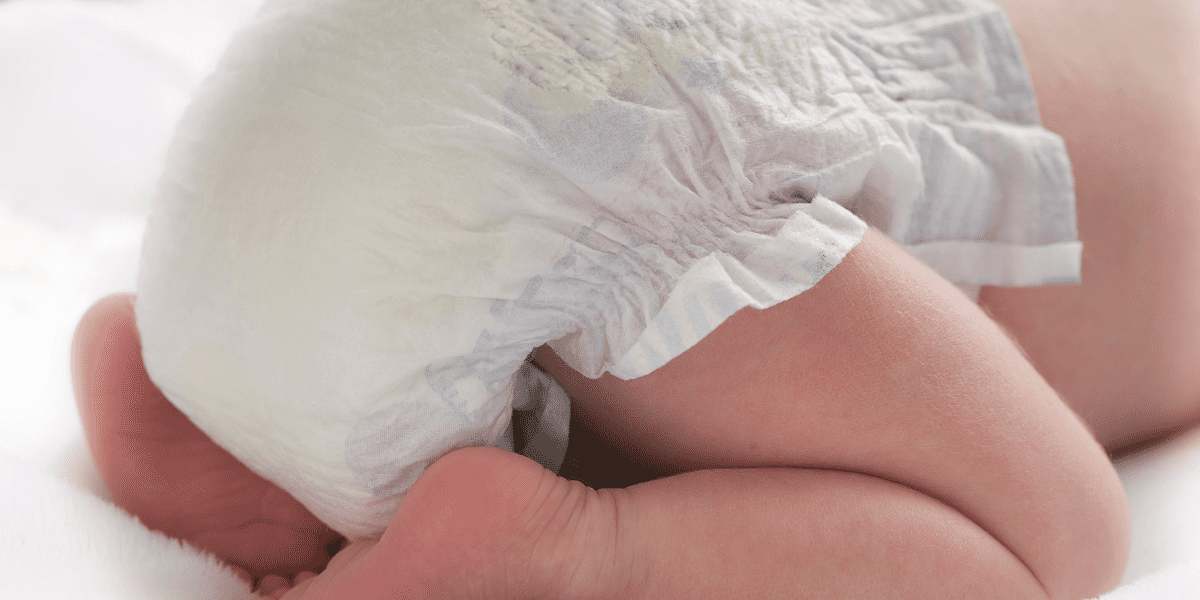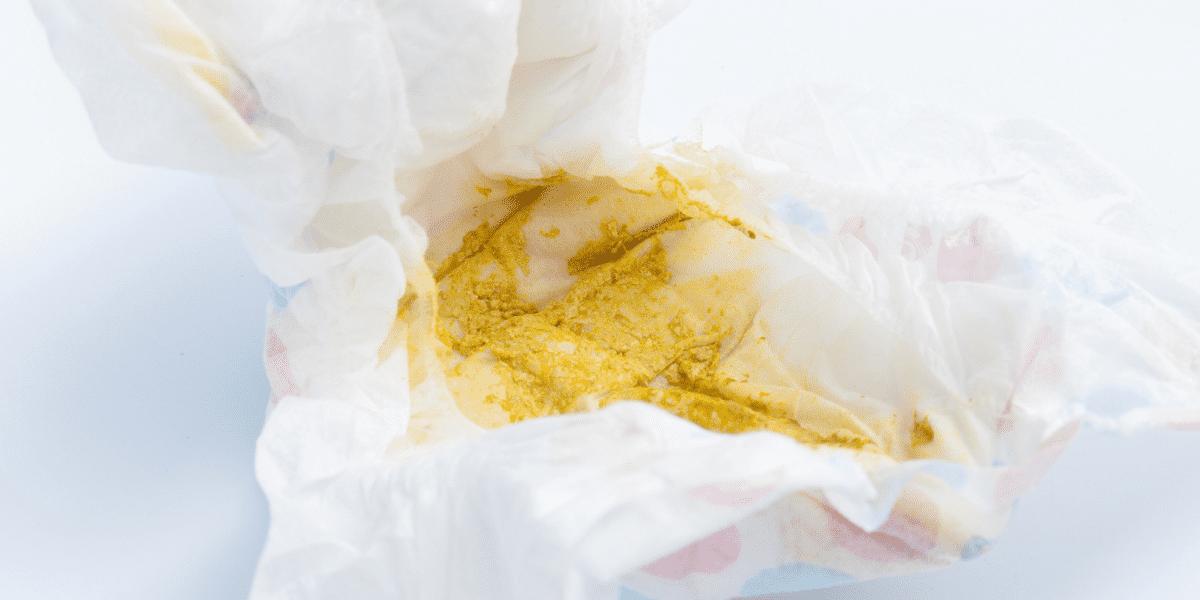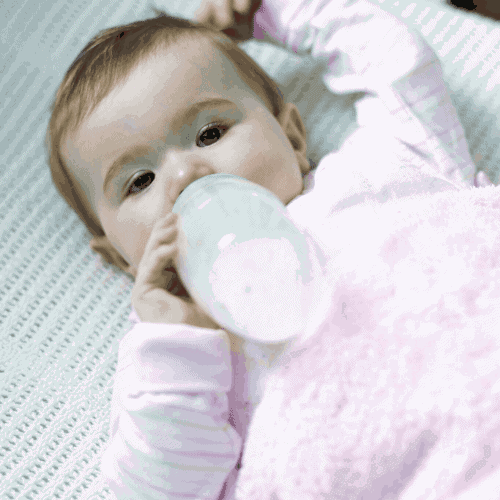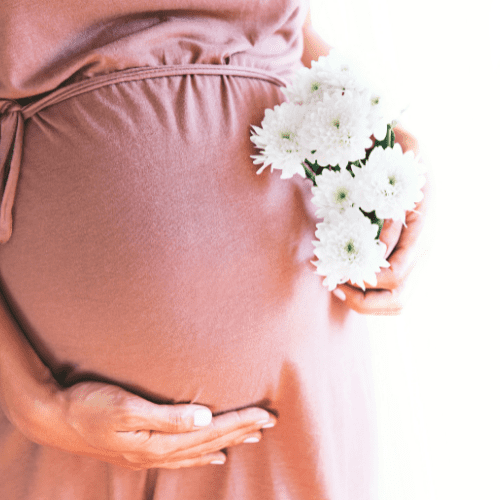If somebody was to tell you that when you became a parent you would spend a lot of time focusing on poop, you would have thought they were mad.
But yes, it is true. Your newborn’s poop changes color many times in the first few months of their life. It can often be the only clear indication of what is going on inside your baby’s body.
As an Amazon Associate I earn from qualifying purchases. The links below may be affiliate links. Please read my disclosure policy for more information.
So as a parent you will find yourself studying its color and consistency all the time. It will become the subject of a lot of your daily conversations and something your doctor asks you often at appointments.
Whilst the majority of your baby’s poop will fall into the healthy category there are some abnormal characteristics to look out for that indicate there is something wrong.
It is not surprising then, when you are changing your baby’s nappy and notice specs of white in their stool, to start to worry that something is wrong.
We are here to tell you, you don’t need to panic.

White specs in a breastfed baby’s stool are most likely to be little bits of undigested milk. It will be common for you to see undigested food in your baby’s stool from the newborn days through to the toddler stage.
This is because babies often process milk too quickly through their digestive tract. Then, when they first start eating solids, they often do not chew their food properly so it flushes straight through their system.
So those white specs you see in your newborn’s stool will most likely be undigested milk proteins that have curdled.
In an older baby, you may see white in their stool if they are regularly drinking a lot of breast milk or cow’s milk. But also if they eat a lot of pale foods, such as pasta, cheese, and yogurt.
Whilst it is very uncommon, there are instances in which white spots in your baby’s stool are a sign that there is a serious underlying problem. In order to know what to look out for, we have provided a breakdown.
Meconium
During the first 24 hours of your baby’s life, they only pass meconium. This will be dark green to black in color and have a tar-like substance. It will also not tend to smell.
Meconium consists of skin cells and other fluids your baby digests whilst in the amniotic sac. Both breastfed and bottle-fed babies pass meconium.
As a tip, feeding your baby colostrum when they are born will help them pass meconium quicker.
Mustard Yellow
As you feed your baby over the first 48 hours their stool will become lighter and runnier inconsistency. If your baby is breastfed their poop will turn a mustard yellow color.
It may even appear to be seedy or watery, do not worry, this is completely normal. Like the meconium, this poo will not have a smell.

Yellowy – Green
Babies who are bottle fed tend to have darker colored poop than breastfed babies. It is also more likely to be firmer and can have a bad odor.
Brown
As you start to introduce solids to your baby’s diet, around 6 months old, you will see a great change in their stool.
Overall it will appear to be a dark brown color, have a firm consistency and smell quite bad.
As mentioned earlier in this article you may also start to notice chunks of undigested food and milk.
Red
The color red in your baby’s stool is often an indication that there are traces of blood present.
If you see this, you should contact your doctor right away and will be asked to provide a stool sample.
But try not to panic, red doesn’t always have to have a sinister reason behind it. If you notice traces of red in your newborn’s poop it could be coming from their mother.
Babies often swallow a little blood during delivery.
If you have a little girl and notice a little red mixed into a dirty nappy it could be vaginal blood. Baby girls can have small vaginal bleeds called False Menses which last from 2 – 10 days old.
It happens as they withdraw from the hormones they were exposed to in the womb. This is completely normal and once it is over they will not experience any more vaginal bleeds until they begin their period as preteens.
Remember that, just like with the pale foods, the red color in a weaning baby’s stool could simply be a transfer from the food they were eating. In particular, beetroot can cause red poop.
Black
If you are noticing black stools after the meconium stage in the first 24 hours then this can be an indication that there is blood in your baby’s stomach.
This should not be confused with dark green stools which can appear black under certain lighting. This green stool is completely normal.
But if your baby’s poop is black you need to contact your doctor.

White
Having small specs of white in your baby’s poop is most likely undigested milk. But there are other factors that can cause this pale color.
Certain antibiotics can have an effect on the color of your newborn’s stool. Particularly antibiotics prescribed for ear infections.
An iron deficiency also known as Anemia can make your baby’s stool pale in color.
Anemia happens when there aren’t enough red blood cells to effectively carry oxygen around the body. The cause for anemia in a newborn baby is often because the mother takes enough iron in her pregnancy.
A pregnant mother is encouraged to eat plenty of iron-rich food such as red meats.
A baby that has anemia will often not only have pale stools but also show characteristics such as, always being sleepy and irritable.
They may constantly have a pale complexion and might develop a painful swollen tongue.
Amenia can be treated with liquid iron supplements if breastfed and iron-fortified formula if bottle-fed. However, if left untreated, it can delay your baby from reaching developmental milestones.
In an extreme case, your baby’s white poop can be a sign of a serious issue, particularly if the stools are chalky white in color.
This could be a sign that there is a problem with your baby’s liver. It could mean that there is a blockage somewhere in your baby’s liver, this is called Biliary atresia.
Bile is the component that turns stools brown, it breaks down fats. But when there is a blockage, there is nowhere for the bile to go and so it starts to damage the liver walls.
If left untreated it can result in liver failure which quickly becomes a fatal situation.
Baby’s producing chalky stools may also experience symptoms such as, fever, nausea, abdominal pain, and even jaundice which is where the skin and eyes have a yellowish tinge to them.
If you notice any of these symptoms you need to take your baby to be evaluated by a doctor immediately.

Can allergies cause white poop?
Whilst it might seem natural to assume that an allergy can lead to your baby having white stools, particularly a cow’s milk protein allergy, this is not the case.
In fact, it has not been medically proven that there is a link between a milk allergy and undigested milk in a newborn’s stools.
Allergies do have an effect on a baby’s poop. Often a clear indicator your newborn is having an allergic reaction will be diarrhea.
This is often green and slimy or very watery.
If you notice your newborn is suffering from diarrhea and it is happening frequently, make sure you seek medical attention immediately.
Diarrhea can lead to dehydration which can become serious quite quickly in young babies.
Undigested milk in your newborn’s stool will be enough to make any parent worry. You will worry there is something wrong with your baby’s digestion.
Rest assured that undigested milk is normal and something your baby will grow out of overtime.
Your baby’s poop will change color and consistently so often that you will find yourself obsessing over it but in most cases, the changes are a sign of a completely healthy gut being introduced to different foods.
If you do notice something worrying such as red, black, or chalky white stool then seek medical attention immediately as these rare instances can be a sign that something is seriously wrong.

Please remember that when it comes to parenting, no question is a stupid question. Your doctor will be as happy to talk about your baby’s poop as you are and will be able to dismiss any fears you have.
Perhaps even offer advice on what dietary changes to make to help your baby’s developing digestive system.
Then by 12 months, once fully established on solids, your baby’s stools will stop changing color and consistency so often.
You will be able to take a break from obsessing about poop – well that is, until potty training starts!





